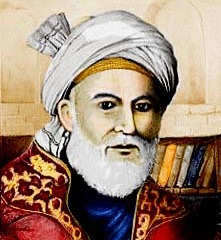
"Sufism without Mysticism: Ibn al-Qayyim's Objectives in Madarij al-Salikin".

Ibn Qayyim al-Jawziyya refers to Ansari with the honorific title " Sheikh al-Islam" in his work Al-Wabil al-Sayyib min al-Kalim al-Tayyab Books (in Persian and Arabic) He expressed his love and appreciation for Ansari in this commentary with his statement, "Certainly I love the Sheikh, but I love the truth more!". The Hanbali jurist ibn Qayyim al-Jawziyya wrote a lengthy commentary on a treatise written by Ansari entitled Madarij al-Salikin. In the reign of the third Rashid Caliph, Uthman, Abu Mansoor al-Taabi'i took part in the conquest of Khorasan, and subsequently settled in Herat, his descendant Khwajah Abdullah Ansari died there in 1088. The lineage is described, and traced in the family history records, as follows Ību Ismail Khajeh Abdollah Ansari, son of Abu Mansoor Balkhi, son of Jaafar, son of Abu Mu'aaz, son of Muhammad, son of Ahmad, son of Jaafar, son of Abu Mansoor al-Taabi'i, son of Abu Ayyub al-Ansari. Khwajah Abdullah Ansari of Herat was a direct descendant of Abu Ayyub al-Ansari, a companion of the Islamic prophet Muhammad, being the ninth in line from him. He is said to have had a very impressive personality, and used to dress gracefully. Whatever his disciples and followers used to present to him was handed over to the poor and the needy. His yearly majlis-e wa'az was attended by people from far and wide. He used to avoid the company of the rich, powerful and the influential. This is among the earliest complete Sufi Tafsirs ( exegesis) of the Quran and has been published several times in 10 volumes. After his death, many of his sayings recorded in his written works transmitted by his students were included in the Tafsir of Maybudi, "Kashf al-Asrar" (The Unveiling of Secrets). His most famous work is "Munajat Namah" (literally 'Litanies or dialogues with God'), which is considered a masterpiece of Persian literature. He wrote several books on Islamic mysticism and philosophy in Persian and Arabic. He excelled in the knowledge of Hadith, history, and ʻilm al-ansāb. The Shrine of Khwaja Abd Allah, built during the Timurid dynasty, is a popular pilgrimage site. He practiced the Hanbali school of Sunni jurisprudence. Ībdullah was a disciple of Abu al-Hassan al-Kharaqani.

His father, Abu Mansur, was a shopkeeper who had spent several years of his youth at Balkh. He was born in the Kohandez, the old citadel of Herat, on.


 0 kommentar(er)
0 kommentar(er)
